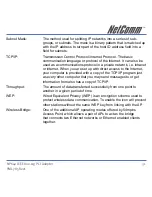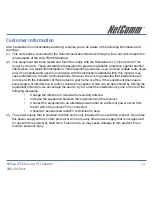
NP642 IEEE 802.11g PCI Adapter
25
YML785 Rev1
APPENDIX A: Glossary
Access Point:
An internetworking device that seamlessly connects wired and
wireless networks.
Ad-Hoc:
An independent wireless LAN network formed by a group of
computers, each with a network adapter.
AP Client:
One of the additional AP operating modes offered by a 54Mbps
Access Point, which allows the Access Point to act as an Ethernet-
to-Wireless Bridge, thus a LAN or a single computer station can join
a wireless ESS network through it.
ASCII:
American Standard Code for Information Interchange, ASCII, is one
of the two formats that you can use for entering the values for WEP
key. It represents English letters as numbers from 0 to 127.
Authentication Type: Indication of an authentication algorithm which can be supported by
the Access Point.
1. Open System: Open System authentication is the simplest
of the available authentication algorithms. Essentially it is a null
authentication algorithm. Any station that requests authentication
with this algorithm may become authenticated if 802.11
Authentication Type at the recipient station is set to Open System
authentication.
2. Shared Key: Shared Key authentication supports authentication
of stations as either a member of those who knows a shared secret
key or a member of those who does not.
Backbone:
The core infrastructure of a network, which transports information
from one central location to another where the information is
unloaded into a local system.












































